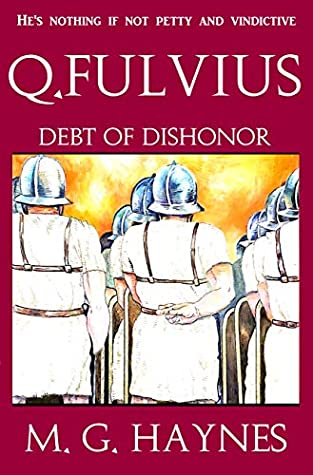
Blurb
In Rome, 216 BC, Fulvius is a murderer, a thief, and condemned to die. Saved by the catastrophic defeat of the Roman Army at the hands of the Carthaginian General Hannibal at nearby Cannae, he’s forced into the legion and an altogether unfamiliar world of soldierly duty and honor. Realizing promotion as the unexpected reward for paralyzing fear, Fulvius finds the Army not so dissimilar to the shadowy Roman underworld he knows so well and schemes to make the experience worth his while. He betrays, and is in turn betrayed, in a whirlwind cycle of threat, violence, and criminality leading to an ultimate showdown and reckoning that could undermine the entire war effort. Hannibal is no doubt coming, but that may be the least of Rome’s troubles.
My Review
In “Debt of Dishonor” we have a most unusual protagonist. Fulvius, a confirmed thief and rogue, is rescued from execution to be conscripted into a new legion along with other misfits; Hannibal is coming and the Romans are scraping the bottom of the barrel. Fulvius is far from a hero—nor is he likely ever to turn into one. Hopelessly stuck, he does demonstrate a propensity to make the best of a bad situation, even finding ways to profit with the most unscrupulous stratagems. Of course, the threat of getting discovered forces him into even more dangerous maneuvers. All the while, what he really wants is to escape, but he can’t figure out how:
Two hours later, after securing a pass from Gracchus, Fulvius found himself alone outside the camp for the first time since his “enlistment.” Walking at a brisk pace, one thought kept repeating itself over and over again: Run! Still, the chance he’d successfully make his escape appeared slim, as his absence would be noticed by dinnertime, a mere half a watch away. To bolt now, while the tribune was hot on his trail, would leave him hunted, likely by the very cavalrymen whose reputation he’d sullied. No, he had to take care of this problem and return to camp. Better opportunities for escape would surely present themselves in the future.
Because Fulvius has no conscience, we the readers can give up our conscience too. After all, it’s his story. So instead of making judgements on our protagonist, we can blithely go along for the ride. He is deliciously sardonic, naturally amusing, and appropriately rattled when things go wrong. But he always lands on his feet. I don’t think I ever cheered for him along the way, but I wanted to see how he got out of each mess. I admit that at times he was too clever and I had trouble keeping track of the situation—and the characters. Some had first and last names that were used interchangeably—I think. I’m still not entirely sure. But overall it was a good ride.

Amazon:
https://www.amazon.com/gp/product/B082H5GKT8